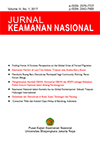Finding Home: A Forensic Perspective on the Global Crisis of Forced Migration
Keywords:
migration, legal, forensic science and humanitarianAbstract
Forced migration is a major social, political, legal, and public health challenge for the world today. Many developed countries are struggling to keep up with the massive influx of refugees streaming in bringing a myriad of issues that need to be addressed. Despite fleeing for their lives when crossing geographical borders, refugees still have the legal burden of validating asylum claims. This paper aims to discuss the different roles that forensic science can partake in managing the global crisis of forced migration. In a legal aspect, the role of forensics is to provide evidence that can aid refugees in their asylum proceedings, such as age estimation for minors, physical and mental health assessments, and investigation of torture allegations. Despite polarising public opinion and many problematic challenges involved in working with refugees, the spirit of forensic science has always been about objectivity without discrimination. It is within the professional duty of forensic experts as members of the global community to contribute what they can in this humanitarian crisis our society is currently facing.

Downloads
Published
Issue
Section
License
Please read and understand the copyright terms for submissions to this journal.
Copyright Notice
The Jurnal Keamanan Nasional is under the Creative Commons Attribution 4.0 International (CC-BY 4.0) License, according to which:
1) Authors retain copyright and grant the journal the right to first publication, with the work simultaneously licensed under the Creative Commons Attribution (CC-BY 4.0) that allows the sharing of articles published with the acknowledgement of authorship and the initial publication in this journal.
2) The authors are authorized to make additional contracts separately for distribution of the version of the work published in this journal (for example, publication in an institutional repository or as a chapter of the book), as long as there is recognition of authorship and initial publication in this journal.
3) Authors are authorized and encouraged to publish and distribute their work online (for example, in institutional repositories or on their personal pages) at any time before or during the editorial process, as it increases the impact and reference of the published work.

